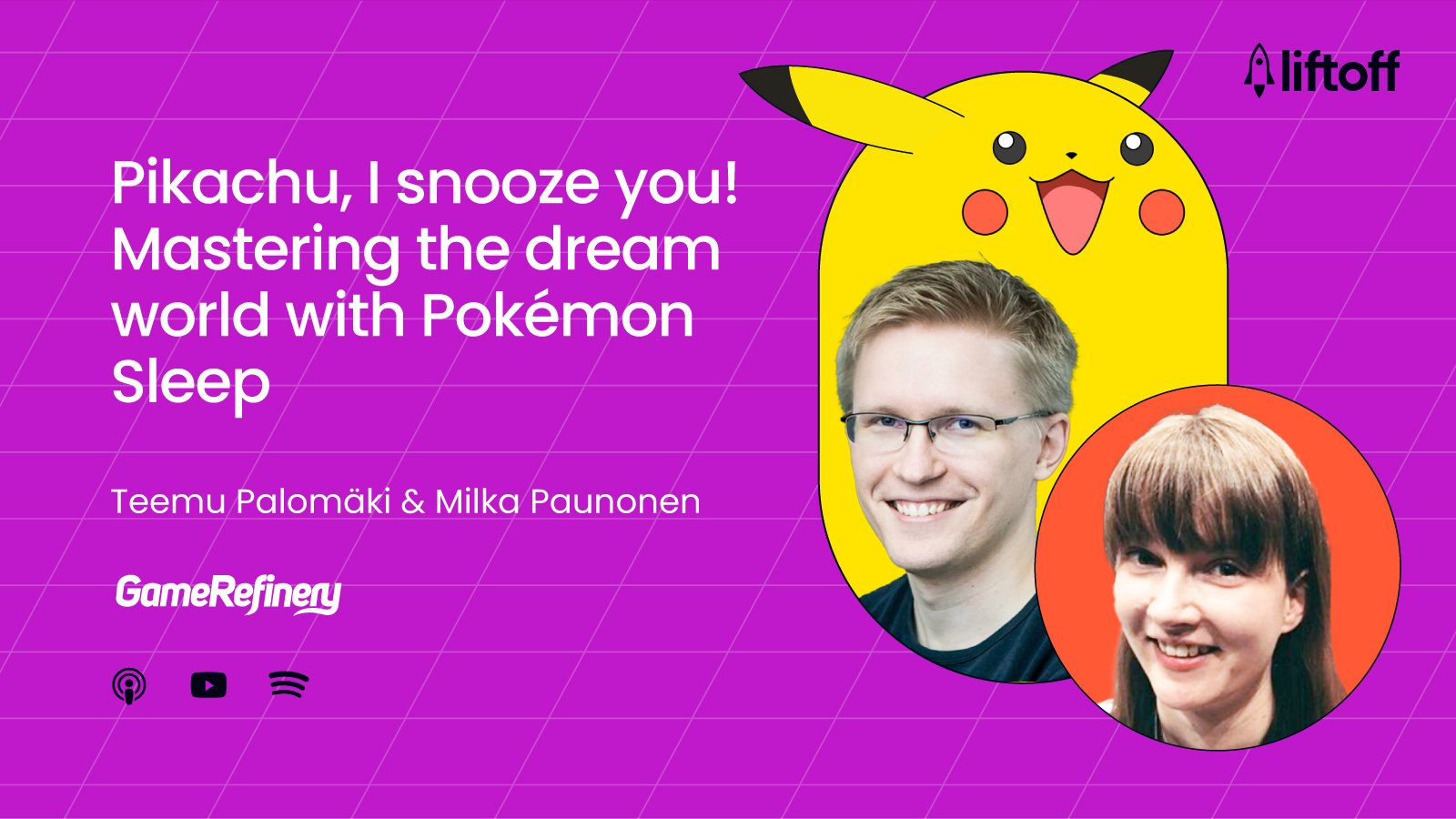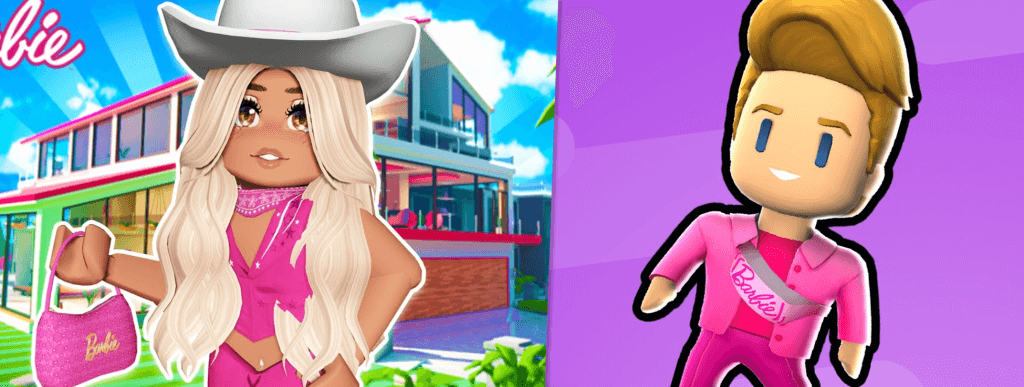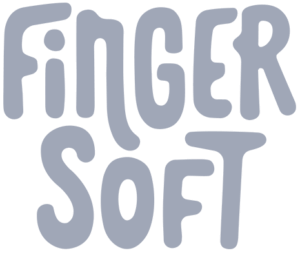Join us as we unravel the exciting details of the latest addition to the Pokémon universe: Pokémon Sleep. This innovative app has taken the concept of gamification to a whole new level by transforming how we approach sleep.
![]()
![]() Spotify, BuzzSprout, TuneInRadio, iHeartRadio
Spotify, BuzzSprout, TuneInRadio, iHeartRadio
– If you enjoy the episode, remember to hit subscribe!
Are there benefits to merging gaming with sleep? Find out how Pokémon Sleep stacks up against other sleep-related apps. We’ll delve into the unique features that make Pokémon Sleep a standout experience and explore how it integrates into the broader Pokémon ecosystem. But that’s not all; we’ll discuss if there could be plans to extend its reach beyond sleep and venture into the realm of promoting other healthy habits.
You can also watch the episode on YouTube:
Topics we will cover in this episode:
- Introduction
- Understanding Pokémon Sleep Gameplay
- Comparing Pokémon Sleep to other sleep-tracking apps
- Pokémon brand strategy and wellness focus
- Benefits and concerns of Pokémon Sleep
- Pokémon GO Plus device and sleep tracking
- Market reception and future potential
- Future possibilities for the Pokémon brand
Read Transcript
Introduction
[00:00:00] Jon Jordan: Hello, and welcome to the Mobile Games Playbook. Thanks for tuning in for another episode. This podcast is about what makes a great mobile game, what is and isn’t working for mobile game designers, and all of the latest trends. I’m your host Jon Jordan. And joining me today, we have two experts from GameRefinery. We have Teemu Palomäki, who is the Chief Game Analyst for the Japanese region from Game Refinery. How’s it going, Teemu?
[00:00:26] Teemu Palomäki: It’s going great! It’s great to be here.
[00:00:28] Jon: Good. And, doubling up on the Japanese brain trust, we have Milka Paunonen, who is the senior game analyst for Japan at Game Refinery. How’s it going, Milka?
[00:00:37] Milka Paunonen: It’s going great. Thanks for having me.
[00:00:39] Jon: Good. And the reason we have our Japanese Brain Trust on the podcast today is we are talking about a Japanese app. And a very particular Japanese app, Pokémon Sleep. So Pokémon Sleep, I guess, is now, I would say, following in the trend or lineage of a gamified health app from Pokémon.
So, we had Pokémon Smile, which is an interesting teeth-cleaning app for children that came out last year, and now we have Pokémon Sleep, which, as the name suggests, is all about gamified sleep and wellness in that area. So, Teemu, do you want to kick us off with, like, an overview, and then obviously we’ll drill down into very specifics of what’s going on there, but, for people who haven’t used it, including me, give me the rundown of Pokémon Sleep, what are we doing here?
Understanding Pokémon Sleep Gameplay
[00:01:24] Teemu: Yeah, so Pokémon Sleep, it was released, on July 17th, so relatively recently. It’s a game about, well, sleeping. You’re collecting Pokémon, or you’re observing how they sleep. So there are different sleeping habits in the Pokemon world. These Pokémon can have up to four sleeping styles. Like for example, Psyduck, the yellow duck, always has headaches but can sleep with a headache or have a tantrum or yawn in their sleep, or they can sleep on top of this big Snorelax Pokémon.
In the app, that is kind of the centre of your Pokémon Sleep observation area. So there is the big Snorelax there that you level up by sleeping. In the app, you level it up in one-week periods and then move to another island. Alternatively, you can stay on the same island but your progress with Snorelax resets. But the Pokémon you collect, you can update and upgrade by observing their sleep patterns, those you can keep and train and gain long-term progress, and, you know, based on your own sleeping style, you will have progress.
More generally, the app tracks how you sleep. The sounds you make when you’re sleeping, you can even listen to how you sound in your sleep when you wake up if you’re brave. I still haven’t been able to take that step yet. But there are different levels of sleep, whether it’s shallow or deep. In the game, there’s dozing, snoozing, and slumbering. Depending on which of these types is dominant for your night of sleep, the Pokémon related to that group can be observed and then caught.
Depending on how well and how much you sleep, you can catch them. I think for adults, if you sleep eight and a half hours, you can get the full rewards. But if you’re like me and have a toddler, you might sleep something like four and a half hours, and then you get lesser rewards. That’s basically how the base game runs.
[00:03:57] Jon: I guess at a very superficial level, the nice thing about it, and maybe one of the triggers they wanted to do, is it does play into the characteristics of some of these Pokémon. So, we could argue, or not, that it’s a little bit crowbarred in perhaps. Maybe Pokémon doesn’t immediately make you think about doing a sleep app.
But there are elements in there that, if you’re a big Pokémon fan, play into the fact that some of these have different characteristics, and some of them are sleeping all the time. So there is a nice holistic tie-in there to some degree.
[00:04:30] Teemu: Yeah. Completely.
[00:04:32] Jon: Milka, in terms of, obviously, it’s a playful app, a gamified app. It’s maybe more towards children just with the Pokémon franchise. But compared to the serious industry around analysing sleep and various things you can do there, various different apps and hardware like Fitbit, Whoop, or other healthcare apps, where does Pokémon Sleep compare to those things, or are we making the wrong comparison there?
Comparing Pokémon Sleep to other sleep-tracking apps
[00:05:09] Milka: Yes, actually, I use Fitbit quite a lot, regularly. I compared a bit of data from Fitbit to the Pokémon Sleep data. I was actually quite surprised; initially, I was a little bit sceptical about the Pokémon Sleep app. Yeah, it is a game essentially, so can it really be good for this kind of sleep tracking? I was quite amazed at how similar the data was to my Fitbit app data. So with all of these devices, they’re not exactly 100% accurate. You can’t really get accurate data on how long you are in the deep sleep stage or anything like that, for example.
So, in that sense, it doesn’t really matter if it’s not exactly the same. But for collecting data in a casual way, to get a general idea of your sleeping habits, I think Pokémon Sleep is definitely good enough. And it’s free, so it can be an alternative for those on a budget compared to these more precise devices. The looks of it, it’s a cute app with cute visuals. I don’t know if it has a lineage, as some people might think. It is quite catered to casual users and kids with visuals. But I don’t see any problem with the data.
In some ways, it’s probably even better. For example, I know for a fact that I woke up two times last night, and my Fitbit device didn’t track those times, but Pokémon Sleep could actually detect those moments when I was awake at night. So maybe it was because my heart rate didn’t fluctuate that much that Fitbit didn’t recognise it, but the app could. Even the Pokémon Sleep could give me more data about my breathing and stuff, like listening to me and tracking it during my sleep.
I don’t see any problem with it. So yeah, that’s my take.
[00:07:57] Jon: In terms of Fitbit, it is a specific hardware device you’re wearing, and the Pokémon-Pokémon Sleep is basically, you’re just putting your phone near your bed, isn’t it? Is that how it works?
[00:08:08] Milka: Yeah, yeah. And it is a different mechanic entirely. But in that sense, I must say for Fitbit, it is not the core function of the device. So although it is a fitness device first and foremost, it’s just an extra feature, you know, the sleeping tracking. But anyway, I found it surprisingly like Pokémon Sleep data; it was surprisingly good too.
[00:08:36] Jon: Good-good. And the interesting thing, just reading some of the marketing around it, is that it has this idea. You have your phone by your bed, which obviously lots of people say you shouldn’t have your phone right by your bed.
But the point is, when you wake up in the morning, you can immediately see what’s going on in the Pokémon world. So, it is quite an interesting retention mechanic they’ve got going on there. The first thing you do in the morning is check out your Pokémon. But is that the whole point of it?
Pokémon brand strategy and wellness focus
[00:09:03] Teemu: Yeah-yeah, it is. And it can also be like, kind of building the strength of the brand. I must say this is kind of like a style of gameplay that works only with Pokémon like similar to how we have Pokémon GO. It only succeeds in the West, at least, and it’s only with the Pokémon brand. Anything else Niantic has tried has kind of failed in Japan.
They have, I think, Dragon Quest Walk from Square and exist really well. That’s fighting-based, and it’ll be interesting to see how Monster Hunter now does when it launches later this year, which is also kind of fighting-based. Then you have the girl collector, it’s sort of like transformers, where you go around Japan’s train stations and capture these girls that have designs influenced by different trains. That’s also popular in Japan. But other than that, these location-based games are not a thing. But with Pokémon Sleep, the sleeping thing, I suppose you could make a side mode in a game. If you want additional rewards for a game, then you can track your sleep. But other than that, I think this is a very Pokémon thing to do.
But it’s frankly, it’s really just promoting the brand. Like, it’s the last thing you do before you go to sleep and the first thing in the morning, so your life is all-around Pokémon. And then you go about your day, and you play Pokemon. When you go brush your teeth with Pokémon Smile, then, you know, you walk to your work with Pokémon Go. It’s all Pokémon, Pokémon, Pokémon. So, I think it’s interesting to see what is the next wellness thing that Pokémon brings out.
[00:11:01] Jon: I mean, do you…
[00:11:03] Milka: Yeah.
[00:11:04] Jon: You go, Milka.
[00:11:06] Milka: Oh, yeah, I was just going to say that. It’s possible that Pokémon really wants to expand the brand to really be a part of people’s daily lives. Like, all parts of it, outside of gaming, and it’s a great way to introduce these, well, very simple but still probably addictive, lifestyle habit apps.
So, I was actually thinking, this is probably the perfect time for them to release apps like Pokémon Smile, and even Pokémon Sleep because Pokémon is becoming multigenerational. So, the brand is expanding to new demographics. The generation that was there for the original games is actually now having kids of their own, and, like, it’s a great way of introducing the characters through these apps, like, Pokémon Smile and, like, these games. And, well, I was also thinking, like, is it good to make it an app on your phones because it can be used as a reward mechanic for you? Like, if you brush your teeth, you get rewards out of these games. Is it good to make phones your method of reward? I don’t know, but yeah, it’s an interesting thing to think about, at least.
[00:12:28] Jon: I mean, as a parent, I can see the Smile one being a more useful lever because getting them to brush their teeth is just really difficult. You’re either doing it yourself, or they become of an age where you have to trust them. But you never quite trust them, so– And that seems like, you know, quite a nice little app that you could have, and you’re using it twice a day, and that’s what builds a routine around that.
The Sleep one, you know, it seems harder for me to work out, you know, is this a fairly lightweight thing that is, you know, they’re doing it as a very much an experiment, or is this actually quite a clever approach, as I say, to get people to use it. So the last thing you do at night is Pokémon, and the first thing you do in the morning is Pokémon. The fact that your sleep doesn’t really matter. There’s a quite subtle but strong commercial edge to it.
I mean, should we? Sorry, how do you think we should be thinking about this? Is this a serious Pokémon game that has not a lot of depth but has been clearly thought out and treated seriously, or do they expect people to be doing this every day, and being retained, so they can add a monetisation strategy in there? Or is this a bit more of a Smile-type app? You know, it’s an interesting thing that it doesn’t really matter.
Benefits and concerns of Pokémon Sleep
[00:14:00] Teemu: Well, I think this one is more serious. You know, Pokémon Smile it’s definitely aimed at kids. It doesn’t have any ads or monetisation mechanics. It’s just a way for parents to, well, get their kids to brush their teeth. You can think of it from a parent’s perspective, “This is to help my children to brush their teeth and become healthier,” in that sense for Pokémon. It’s like, “Okay, let’s make sure that Pokémon is present in their lives, and it becomes a meaningful part of their life, and then later in their years, we can sell them stuff.”
But, like, this is different. I don’t know if it comes from Pokémon Go’s success. So they have this and are thinking, “Okay, we improved people’s commuting habits and walking, so people became healthier. What is the next step we can do?” And sleeping is something that is often overlooked. If you think about what gamers are bad at, I think sleeping is very high on that list. Eating would be the other one, but eating, there are so many things to consider, like eating disorders and allergies and stuff that you need to be really careful with, and it’s harder to track. So I think sleeping is something that is easier to track, and that’s why they’ve gone for it.
And I think Pokémon is building this wellness brand and trying to be serious about it. And they have used similar monetisation mechanics in Pokémon Sleep that they do in Pokémon Go. For example, you expand your inventories, and you buy these consumable boosts with which you can catch these Pokémon and kind of upgrade them. So, it’s very similar to Pokémon Go in that sense. So I would say it’s a very serious app, unlike Smile.
[00:15:53] Jon: And it’s a good point that you do make there about Niantic, the US company behind Pokémon Go. I think it’s often overlooked how serious that company is about getting people to move. So the fact that they were so successful with Pokémon Go, I mean, that they’ve had various apps before that. The guy who founded the company actually invented Google Earth, or the company he invented became Google Earth. And he’s very active in changing people’s habits. He sees it as a mission to get people moving. That’s very much his thing.
The reason they were doing location-based games is he really wanted to get people out there and exploring. So, I think the fact that Pokemon Sleep is a game, there is a strong social mission that they do have behind some of these things. I don’t know so much about the sleep thing. I mean, there have been some issues with people with sleep becoming a performance mechanic. Do you think it’s just hype, or is it just headline-grabbing stories? I did see there were issues around the gamified process. When you gamify something, you put incentives on things, but sometimes they can overstep the mark, so that cannot be a good thing for a lot of people.
[00:17:23] Teemu: Oh, yeah. I think that’s definitely something to consider. If you’re building the habit that you are constantly kind of gaming, everything is a performance. You can’t actually enjoy anything. Especially if how well you sleep is tied to the rewards you get in the game, that can make sleeping more stressful. Yeah-
[00:17:46] Jon: And then, I mean, I’ve heard stories that people were taking sleeping pills, which just seems to be insane. But maybe it’s just people who just do the silly thing and that it’s not really the fault of the app, but you know, there is that consideration.
[00:17:59] Teemu: Yeah, yeah. People do silly things, which is one of the risks of the game. Another risk, you know, is people also use these slightly damaged charging cables. Now, combine that with an older phone that you leave on your mattress next to you at night. Personally, I’m just waiting for the first headline that someone’s house caught on fire because of Pokémon Sleep. So I think that is a very real risk.
The radiation part is another risk. Phones emit a small amount of radiation. In modest use, it’s not a big problem, as far as I’m aware. But, like, in the long run, if you’re using your phone throughout the day and then during the night you leave it on next to you, that can cause trouble in the long run, like, decades later or something, you start seeing the impact. But yeah.
[00:19:12] Jon: I mean, it is interesting, isn’t it? Clearly, I think what they’re trying to do is something that is positive for people. As you say, most people don’t sleep enough. I mean, that’s the basic crux of the matter. So maybe we shouldn’t be complaining about all these edge cases. And I mean, Milka, have you, obviously, you’re someone who’s got a Fitbit, so you’re interested in that stuff anyway. Have you found Pokémon Sleep, has that made you think more about sleep, at least in a very passive case, that you think, “Oh, instead of playing another hour of whatever, some game, I’ll go to bed earlier and improve my Pokémon Sleep score”?
Because I guess that’s what they want, is they want that subtle nudge. Over time, it’s different from every day you’ll go to bed at eight o’clock to maximise your score because no one’s going to do that. But it’s just subtle. I mean, do you think that’s worked?
[00:20:00] Milka: Yeah. I actually felt that it did feel rewarding to me to actually wake up in the morning and see, “Oh, wow, I got this Pokémon.” And it actually felt quite rewarding, more so than just, you know, going to see your score in the app, and then it’s that’s it. So I feel like there’s definitely– It’s definitely motivating in that sense.
I was also thinking about the concerns about the game. Like when you have the phone next to you when you’re going to sleep, it may be a distraction in itself. And again, I’m going back to this, like, if there are kids who use it, can they control the urge to just take the phone and start doom scrolling or whatever. So that was something that I was thinking about, but for me, at least, it wasn’t a problem.
But some people may find it a little bit difficult to sleep with their phone next to them, and that’s why I’m quite disappointed that I heard that the Pokémon, the Pokémon GO Plus Plus device isn’t quite as good at tracking sleep, so I was hoping that it would be, so you wouldn’t have to take your phone with you to the bed but, –
Pokémon GO Plus device and sleep tracking
[00:21:29] Jon: Teemu, this is your-your opportunity to shine. Tell us about this little device and whether it works or not.
[00:21:38] Teemu: Yeah. I actually bought one for myself just because I wanted to kind of improve my sleep – Well, I say that I also track Pokémon GO at work as well, and I wanted to try Pokémon Sleep.
[00:21:50] Jon: Can you explain a little bit more because it’s not just for Pokémon Sleep, is it, that’s an ancillary, so what is that device? Why would you use it in general?
[00:21:59] Teemu: Yeah, so the Pokémon GO Plus Plus device is a device that can track your movement with Pokémon GO. So, while you’re playing Pokémon GO keeping the game open, the device is connected to it with Bluetooth, and then every time there is a Pokémon close by, the device starts vibrating and flashing colours. And if you press the button at the centre, then the game tries to catch a Pokémon, you have one chance with this device to catch them. So a lot of the Pokémon are going to run away, but you catch more than you would if you were just walking by and trying to get them on your phone.
[00:22:50] Jon: So effectively, you don’t need to use your phone. You have to have your phone in your pocket, and this thing buzzes; you press the button like automation.
[00:22:57] Teemu: Yeah, and the plus side is that it saves the battery. And it’s really nice in that sense, and it can be used to track your sleep with Pokémon Sleep. For me, the success rate was really low. I’ve tried it like, I think, four nights, and I’ve managed to track sleep with just one of them. So, we’re getting closer to the success rates of getting a five-star character in a gacha mobile game, which is really poor from the player’s perspective.
But it is a nice concept. I wish there was a small screen that would tell you what is actually happening when you sleep. Like, okay, the tracking started now, and this is what we’re tracking. You started tracking successfully, and then when you close it, then okay, the tracking ended successfully so that you would have some feedback instead of just these vibrations and stuff. But this device actually, well, people were incentivised to buy it so that you would get these special tasks in Pokémon GO. And here is the interesting part about Pokémon GO and Pokémon Sleep. Those apps actually communicate with each other. So, depending on how well you sleep, when you can connect a device again to Pokémon GO, you can get additional rewards there.
And then, depending on how many steps you’ve walked or Pokémon catch or sleep, you can get additional rewards for this special Pikachu that you obtain through this device in Pokémon Sleep. So, the apps are kind of communicating and building that lifestyle, the Pokémon lifestyle, together.
[00:24:54] Jon: I mean, presumably, that device works in a different way, trying to track your sleep. It’s obviously a more movement-based thing, I would think. Would it be?
[00:25:03] Teemu: It is for Pokémon GO. It actually doesn’t track movement. For Pokémon GO, it’s just the app kind of sending the location data and stuff. For Pokémon Sleep, it has a microphone that tracks the sleep. So, yeah. So, it’s a listening device.
[00:25:27] Jon: Yeah, I mean, I guess the other thing is that, as people have had with Alexa’s and all those devices, having more microphones in the bedroom, again, is generally seen as not a positive thing. I’m sure Nintendo is more careful than most when it comes to the privacy of those things. I’m sure it’s not recording those things, but equally interesting that, to some degree, any improvement, any time a company wants to improve one part of your life, it butts up against other things that they shouldn’t, like the privacy of our bedrooms or having more screens in our bedrooms. There’s always this tension there.
Okay. So do you think this can be more than a gimmick? You know, I mean, obviously, you two are probably not the target audience, although you may be closer to the target audience than we think, but, you know, is this something that you think you would be regularly using or more generally, other people would be regularly used as part of their lifestyle tracking?
Market reception and future potential
[00:26:37] Teemu: Yeah, I think it could become an important part of life for many. For me personally, I have a toddler who likes to play with the Pokémon GO Plus device. It has flashy lights, so if she wakes up during the night and comes to pick it up because it’s a fun toy, then nothing is tracked. And, so, for me, it’s kind of tedious yet, but I can see it becoming a big part of someone’s life. I found it really interesting. I was hoping it could improve my sleeping. I know I sleep way too little for what I need, but I don’t know. It has some problems, but it seems to be resonating well.
If we look at my notes, in the US, it’s been high on the downloads, in the top 30 or so, quite recently as it also rose to the top 200 in rankings. Before that, it was outside of it. So, in the US, it’s small of a thing, but if we look at the Japanese market, ever since it was launched, it has been number one in downloads.
[00:28:10] Jon: Really? Wow.
[00:28:10] Teemu: Yeah. So, it is really downloaded there. And in the rankings, at first, it was around the top 30, then it dropped down to the 50s or so for a while, and last time I checked, it was somewhere around 15. So, it’s monetising really well, and people are buying stuff. They’re buying these items with which to catch Pokémon or with which to evolve or train those Pokémon. And, you know, they have a subscription model, they have a sleep pass, which, well, the first two weeks are free, but after that, you get a lot of these perks.
So if you form a habit of this game, I think that it can increase the experience. You can write, for example, notes about your sleep, so you can make personal notes that, “On this night, I did this, which caused me to sleep less,” or “This night was really hot, and that’s why I didn’t sleep well.” If you want to track more, you get more ways to track. And what I found interesting; they also have additional lavish rewards every three months. So, they’re incentivising keeping the subscription on because you get improved rewards every three months, which is something I haven’t really seen that much in mobile games. So, like giving additional rewards for keeping the subscription on. So, I don’t know.
[00:29:50] Milka: Yeah, I also thought that, in terms of, like, habit tracking, lifestyle and fitness apps, there are several titles that have gamified elements. But, in the sleeping tracking market, there are only so many gamified sleeping apps. So, for those people who need that kind of incentive to track their sleep and use these apps, there have been literally no options. So, now there’s an option, and it’s Pokémon Sleep. So, for those people who need that kind of gaming feeling in their lifestyle apps, it’s definitely a good option. So I feel like it has a market there.
[00:30:40] Jon: Yeah, no, it’s just like Teemu mentioned. Maybe there’s a geographical uptake, which is just some cultures will be more accepting of it because maybe they really like Pokémon more, or just the way they view day-to-day existence. It may just chime better. Whereas maybe in Western Europe and North America, we’re more nervous about the use of phones and devices, no matter whether they’re good or bad.
So, it may be that split, which will be interesting to see. I mean, I just kind of think, what will be interesting, I suppose, is if it actually becomes a strong definer of encouraging people to sleep more. But, basically, it will make people aware of that for the first time, and maybe only use it some of the time, but people can start thinking, ‘oh, I can get this app for free; let’s try it’. And when they try it for the first time, they use a sleep app, and they realise how badly they sleep. Particularly if they have children, they can look at the data and think oh ‘that’s shocking’. I mean, I’m quite into this stuff. I have lots of health trackers and stuff.
And when you really get stuck getting into it, you know, you realise that you do build these gamified loops to yourself. So, on the health side of things, those apps tend not to be gamified, but you can see over time, they’ll probably become more gamified. So, Pokémon Sleep is actually part of a much wider trend, I think. We’ll probably see people around all wellness and stuff.
Moving on, does Pokémon as a brand have the ability to do more things? I mean, I don’t know what more things you would do. You could imagine a food thing, couldn’t you? You know, you could. People take all these Instagrammable photos of their food all the time. You could imagine a Pokémon-themed thing around that, could you not?
[00:33:35] Milka: Yep.
Future possibilities for the Pokémon brand
[00:32:36] Teemu: Yes, it could be. That was the first thing that came to my mind. Then when I was thinking more, another one that came to mind, you know, from a fitness perspective, is to somehow incorporate Pokemon doing your exercises or stretching or whatever. They can have you on screen alongside a Pokemon to show you what to do. But I don’t know if that’s something they will have. And it might to even be an app, it could be a game. You know, Nintendo Switch has the Ring Fit Adventure with the kind of controls where you have a stretching circle thing. Something like that could definitely be Pokemon-themed. And depending on what moves you do, you can catch Pokémon if you do daily stretches/exercises. And there would be over a thousand Pokémon to catch now, so you could make a really big exercise game.
[00:33:42] Jon: Mm-hmm, yeah. And, as we discussed, Niantic is really interested in the positive being fit as well. I don’t know how successful the Switch game was, but it was a long time ago now. But yeah, there are lots of things we can potentially look forward to.
Lovely. Well, thank you, Teemu and thank you, Milka, for your expertise. In the next podcast, I expect you will both be looking much younger as you have all these enormous amounts of sleep. We’ll wait and see.
Thanks for watching and listening to the podcast. However, you are consuming it. In every episode, we are looking at what’s going on in the space of mobile games. And as we’ve covered so many different things recently. We’re really moving around now, covering specific apps and whole genres and cultures and movements. So please subscribe and come back next time to find out what’s going on with the Mobile Games Playbook. See you then. Goodbye.
[00:34:52] Milka: Bye-bye.
[00:34:53] Teemu: Bye.





















